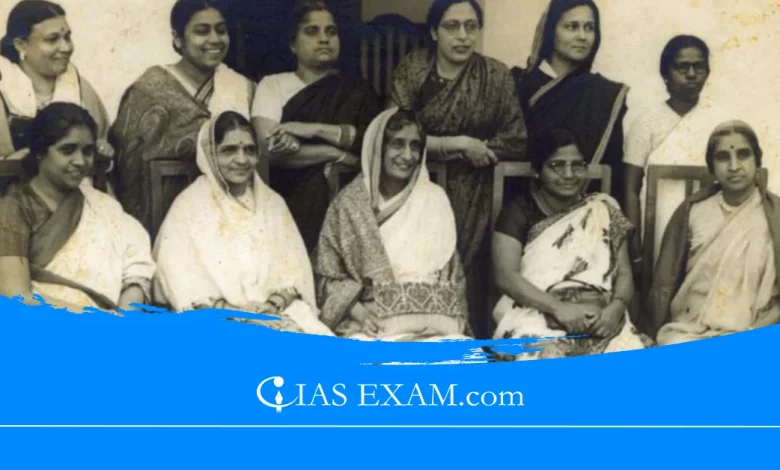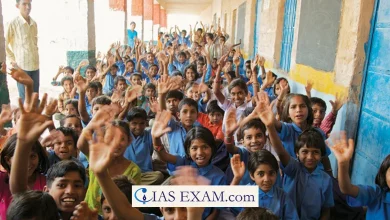Daily Current Affairs for UPSC
Women in the making of Indian Constitution
Syllabus- Polity [GS Paper-2]

Context
Among the 299-member Constituent Assembly, there were 15 women who advocated passionately for a kind of India that would bear the imprint of gender equality.
Influential women members that shaped Indian Constitution
- Annie Mascarene
-
-
- She became the first woman to hold a ministerial and legislative meeting function in Travancore, she raised concerns about under-representation of women in politics.
- She was the first woman to be a part of the Travancore State Congress Working Committee.
- In the Constituent Assembly debates she spoke about the centralisation of energy for a smooth functioning of a democracy, however she also warned in opposition to whole centralisation which could negatively affect the character of democratic establishments.
- She said that the undertaking of the Assembly was to put down the rudimentary ideas of democracy for generations to return and not just for the near future.
-
- Hansa Jivraj Mehta
-
-
- As a member of the Constituent Assembly, she was instrumental in shaping the country’s charter and advocating for gender equality.
- She became the President of All India Women’s Conference in 1946 and proposed the Charter of Women’s Rights.
- Her act of offering the first national flag on behalf of the women of India on August 15, 1947, symbolized the crucial role women performed in the country’s independence and the new era of democracy.
- She made strong arguments in opposition to reservations for women.
- Mehta additionally served on the board of UNESCO and became the first Vice Chancellor of MS University in Baroda.
-
- Dakshayani Velayutham
-
-
- Born into the Pulaya community of Kerala, Dakshayani Velayudhan faced acute discrimination from the higher caste groups in Cochin and Travancore.
- She was the first and only Dalit woman to be elected to the Constituent Assembly in 1946.
- Dakshayani’s time period inside the constituent assembly was described by way of objectives, each inspired and molded by using her time with Gandhi and Ambedkar.
- To make the assembly move past framing a constitution and to provide “humans a new framework of existence” and
- To use the possibility to make untouchability unlawful, unlawful and ensure a “moral safeguard that gives real protection to the underdogs” in India.
- Untouchability-She was a Gandhian, opposed untouchability and supported Article 17 of the Constitution which abolishes untouchability.
- She held to the conviction that most effectively an Independent socialist republic can assist uplift the dalits and deliver them the liberties exercised via every different citizen.
-
- Amrit Kaur
-
-
- Amrit Kaur joined Mahatma Gandhi in the Civil Disobedience motion in 1930 and was captivated with the political participation of women.
- Kaur advocated for universal adult franchise and did not believe in reservations for women.
- Universal adult franchise- Kaur did not believe in reservation, she believed that real equality might only be gained while women made it to the legislature through normal elections rather than by reservations.
- Secularism- She endorsed the Uniform Civil Code alongside Hansa Mehta and desired to update “unfastened practice of religion” with “freedom of religious worship” in the draft Constitution.
- She became India’s first Health Minister and the founding father of the All India Institute of Medical Sciences (AIIMS) who argued for its autonomy.
-
- Ammu Swaminathan
-
-
- Fearless and politically charged, Ammu Swaminathan was a social employee, flesh presser and anti-caste activist.
- Women’s India Association, 1917- She in conjunction with Annie Besant co-founded this affiliation to tackle the social and monetary issues faced by women employees.
- Equality- In the Constituent Assembly, she was a proponent of the person franchise and supported the elimination of untouchability, reflecting her commitment to social equality.
- When the Constituent Assembly resolution was being mentioned, Ammu Swaminathan remarked that, Swaminathan’s personal experiences with baby marriage fueled her advocacy for the Child Marriage Restraint Act and the Age of Consent Act.
- She additionally supported the Hindu Code Bills, which sought to reform Hindu non secular laws and promote gender equality.
-
- Durgabhai Deshmukh- Mother of Social Work
-
-
- At 12 years of age, she participated in the Non-Co-operation Movement and in conjunction with Andhra Kesari T. Prakasam, she participated in the Salt Satyagraha motion in Madras town in 1930.
- Andhra Mahila Sabha- She established the sabha in 1937, which became a beacon for training and social welfare
- In the Constituent Assembly, she weighed in on judicial topics and encouraged lowering the age from 35 to 30 to hold a seat in the Council of Ministers.
- After Independence, she also served in the Planning Commission as a leader of social offerings and became the chairperson of the Central Social Welfare Board (CSWB).
-
- Begum Aizaz Rasul
-
-
- She was the only Muslim woman member of the Constituent Assembly and was a notable figure in India’s constitutional history.
- She firmly opposed reservations and separate electorates based on faith, arguing that such measures would always divide minorities from the majority.
- Reserved seats-She was instrumental in growing consensus amongst the Muslims management to voluntarily give up the demand for reserved seats for spiritual minorities.
- Her efforts in promoting women’s hockey in India had been identified by naming the Indian Women’s Hockey Cup after her.
-
- Vijayalakshmi Pandit
-
-
- She became the first leader to name an Indian constituent assembly to frame a Constitution.
- She was the first woman to maintain a cabinet minister function in the course of the British era and became a vocal proponent for the established order of an Indian Constituent Assembly.
- In the Assembly she underscored the importance of India’s duties closer to its citizens and the global community.
- Notably, she was the most effective woman delegate to the United Nations Organisation Conference and made history by becoming the first woman and first Asian President of the UN General Assembly in 1953.
-
- Kamala Chaudhri
-
-
- She was related to Mahatma Gandhi and took part in the Civil Disobedience Movement in 1930.
- Influenced by Mahatma Gandhi’s non-violent call for freedom motion, she shaped Charkha Committees to unite women.
- Kamla Chaudhry, who was one of the 15 women decided on from across the usa in the Constituent Assembly for drafting the Constitution, remained lively for the upliftment of women through literature and politics at some point of her lifestyles.
-
- Leela Roy
-
-
- She inspired women to sign up for politics, she was a courageous soldier of Indian freedom battle and was a close companion of Subhash Chandra Bose.
- Dipali Sangha- In 1923, together with her buddies, she founded it to establish faculties which were centres of political dialogue in which stated leaders participated.
- Chhatri Sangha- In 1926, an association of women students in Dacca and Kolkata, was based.
- She was instrumental in forming the Dacca Mahila Satyagraha Sangha, which played a lively role in the anti-salt tax movement.
- She started out publishing a magazine referred to as “Jayashree” in 1931 which became edited and managed by women only.
- She quit the Constituent Assembly in protest towards the partition of India.
-
- Sucheta Kriplani
-
-
- She is credited with having established the women’s wing of the Congress party in 1940.
- She is said to have led the Constituent Assembly in singing Vande Mataram, Saare Jahan Se Achcha and the country wide anthem.
- She was India’s first women Chief Minister, she made records by assuming the workplace as the top of Uttar Pradesh government in 1963.
-
- Malati Choudhury
-
-
- Nicknamed “toofani” by way of Mahatma Gandhi for her remarkable power and belief in the combat for freedom, Malati Choudhary now not only played a massive role inside the Civil Disobedience Movement, but additionally as a effective voice of dissent against tyranny and inequality.
- Rabindranath Tagore affectionately called her Meenu.
- Bajiraut Chhatravas- She observed the organisation to fight for the upliftment of vulnerable groups in Odisha.
- She was added in as an crucial member of the Constituent Assembly in 1948.
-
- Purnima Banerjee
-
-
- She performed an important role in the drafting of the Constitution by staying unswerving to her socialist ideology.
- Her belief that education was “right of livelihood and right of earning an honourable bread” should be a part of the fundamental rights of the constitution accounted for many of her early speeches in the assembly.
- She debated that it became the government’s obligation to make certain that through an accepted syllabus, right appreciation of all religions is inculcated into students for the sake of harmony of the country.
-
- Renuka Roy
-
-
- In 1934, she placed forth the famous document: “Legal Disabilities of Women in India; A Plea for a Commission of Enquiry”, where she argued for a uniform non-public law code, in terms of the state of affairs of women in the eyes of the regulation in India.
- She was appointed as the President of All India’s Women’s Conference and made efforts to advise women rights and inheritance rights in the parental property.
- She was also credited with establishing the All Bengal Women’s Union and the Women’s Coordinating Council.
-
- Sarojini Naidu
-
- She is referred to as the Nightingale of India, the first Indian woman to become the president of the Indian National Congress and the first woman to be appointed as an Indian nation governor.
- Fondly called Bulbul by Mahatma Gandhi, Sarojini Naidu was one of the women who were in the leading edge during the liberty battle.
- As a member of the ‘Ad-hoc Committee on National Flag’, she spoke in the Constituent Assembly about the importance and meaning of the country wide flag for India.
- Bappaditya Bandopadhyay quoted “Sarojini Naidu stimulated the Indian renaissance movement and had a mission to enhance the life of Indian women.”
Source: The Indian express
UPSC Mains Practice Questions
Q.Discuss the role of women in shaping the Indian Constitution. (200 words)





.png)



